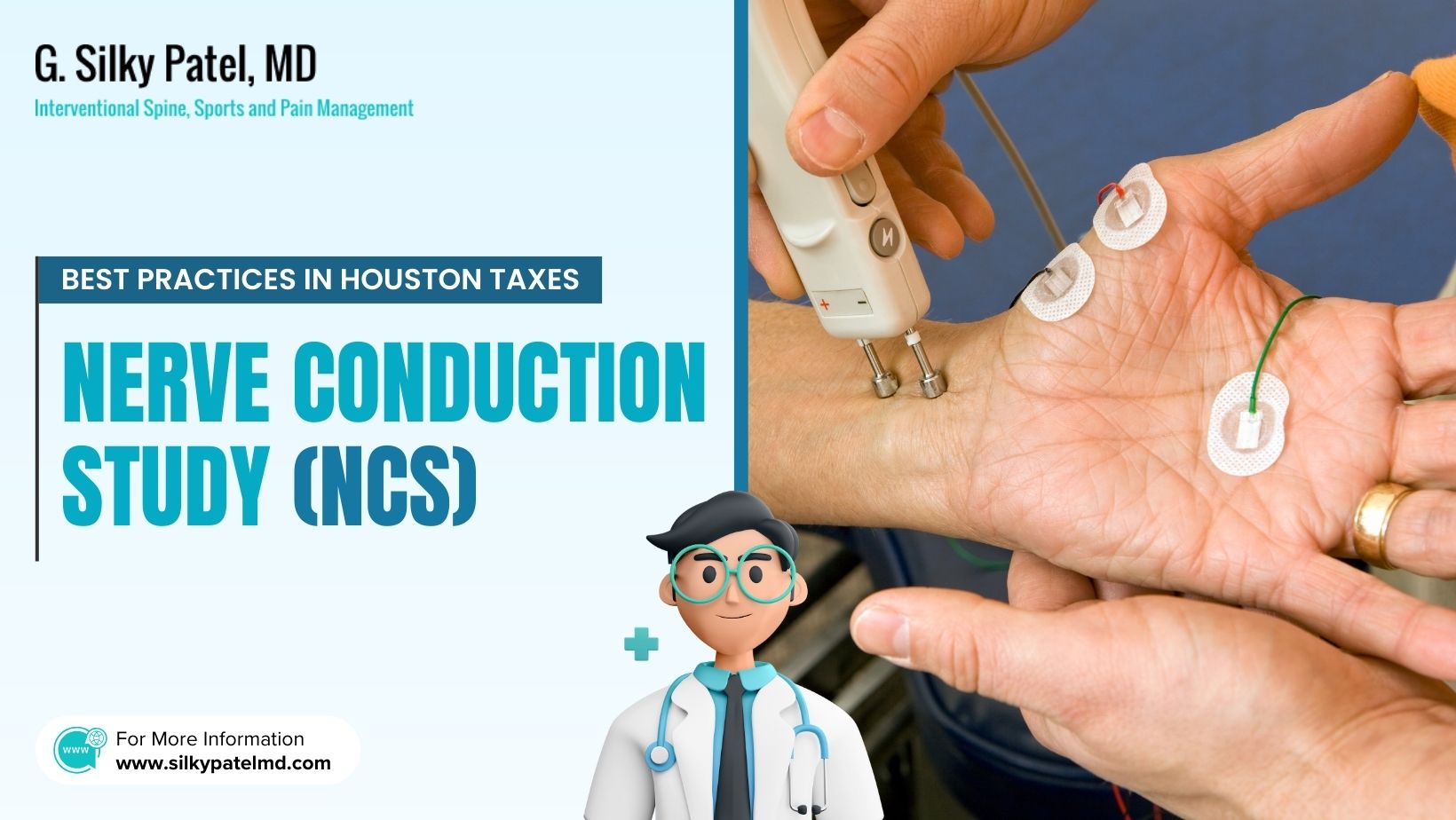Table of Contents
ToggleNerve Conduction Study is one of the most effective ways to uncover what is happening inside your nerves when you experience pain, numbness, or tingling. If you live in Houston or nearby areas such as Katy, Sugar Land, Cypress, Memorial City, The Woodlands, or Pearland, you may have wondered whether this test can finally provide answers for your ongoing symptoms. The truth is, neuropathy and other nerve-related conditions are often hidden below the surface, and traditional scans don’t always explain the full picture.
This test helps measure how fast and how well your nerves send signals. Think of it like checking the wiring in your house—when the flow of electricity slows down, you immediately know something is off. In the same way, a Nerve Conduction Study makes it possible to see which nerves are struggling and why.
Dr. Silky Patel has dedicated her career to helping people in West Houston understand their nerve and pain conditions in a precise, compassionate way. Having trained in neurosurgery and pain medicine at some of the most respected institutions, she knows that clear answers are the first step toward lasting relief. That is exactly why she often recommends this test for patients with suspected neuropathy.
Before scheduling, you may be curious about what is a nerve conduction study, how it works, and whether it is the right choice for your symptoms. In this guide, we will walk you through everything you need to know—from what happens during the test, to how much does a nerve conduction study cost, to what makes Houston a great place to undergo this evaluation.
Nerve Conduction Study in Houston: What is a Nerve Conduction Study and When is it Used?
What is a Nerve Conduction Study
A Nerve Conduction Study is a specialized test that looks at how electrical signals travel along your nerves. Small electrodes are placed on your skin, and quick, mild electrical pulses are delivered to see how fast the nerves respond. If the signals are delayed or weaker than expected, it usually means that a nerve is compressed, damaged, or inflamed.
This test is especially important for conditions like neuropathy, carpal tunnel syndrome, and sciatic nerve compression. By identifying whether the problem lies in the nerve fibers themselves or in their protective covering, Dr. Patel can create a clear plan for treatment.
The Role of EMG Nerve Conduction Study
Often, a Nerve Conduction Study is paired with an EMG, creating what is known as an EMG nerve conduction study. While NCS measures how fast signals travel, EMG looks at how your muscles respond to those signals. Together, the two tests give a complete picture of nerve and muscle health. This combined approach is frequently used in Houston clinics for patients with complex neuropathy or unexplained limb weakness.
Why the Test Matters for Neuropathy
Neuropathy can feel like walking on pins and needles or like your hands are wrapped in thick gloves. Because symptoms can mimic other conditions, a Nerve Conduction Study provides the clarity needed to separate nerve damage from joint or muscle problems. For example, patients in Sugar Land or The Woodlands often come in after years of discomfort with no clear answers. A single test can show exactly where the breakdown is happening and guide the right treatment.
When a Nerve Conduction Study is Recommended
Dr. Patel usually suggests this test when symptoms persist beyond a few weeks or when numbness and tingling interfere with daily activities. It is also used when patients ask about a nerve conduction study near me because they are struggling with unexplained burning pain, weakness, or unsteady walking. The test helps determine whether neuropathy is due to diabetes, chemotherapy, or another cause, and whether further imaging or lab work is necessary.
The Connection to Cost and Procedure
Before booking, many people ask how much does a nerve conduction study cost or what to expect during the appointment. The cost varies depending on the number of nerves tested and insurance coverage, but in Houston the pricing is often more accessible than patients expect. The nerve conduction study procedure itself is straightforward, usually taking 30 to 60 minutes. Once completed, results are carefully reviewed by Dr. Patel, who then explains the findings in plain language so you know exactly what they mean for your health.
EMG Nerve Conduction Study: Why EMG and NCS Go Together
What EMG Measures Versus What a Nerve Conduction Study Measures
A Nerve Conduction Study measures the speed and strength of electrical signals as they travel along your nerves. By contrast, EMG, or electromyography, records the activity of your muscles when they are at rest and when they contract. This means that an EMG nerve conduction study combines two perspectives: how nerves send messages and how muscles respond to those messages. Together, these insights reveal whether the issue starts in the nerve or the muscle.
When Combining Tests Improves Accuracy
For patients in Houston, Katy, and Sugar Land, neuropathy symptoms often overlap with spine or joint issues. In these cases, performing both EMG and a Nerve Conduction Study provides a more complete picture. For example, if you have persistent tingling in your legs, the combined test can tell whether the problem comes from a pinched nerve in your lower back or from damage to the peripheral nerves in your feet. This level of accuracy is especially important for diabetic neuropathy, carpal tunnel syndrome, or unexplained muscle weakness.
How Results Guide Next Steps
When results from an EMG nerve conduction study are analyzed, they show whether nerves are firing too slowly, not firing at all, or sending signals that muscles cannot process correctly. Dr. Silky Patel uses this information to design a treatment plan that might include physical medicine, pain management, or interventional procedures. For patients in Memorial City or The Woodlands, this clarity often marks the turning point from frustration to progress. The results ensure that treatment is based on real evidence, not guesswork.
Nerve Conduction Study Procedure: Step-by-Step Expectations
Before Your Visit in Houston
Preparing for a Nerve Conduction Study is simple, but a few small details can make the experience smoother. Patients are usually asked to avoid lotions or creams on the skin since these can interfere with electrode placement. If you have implanted devices, such as pacemakers or defibrillators, Dr. Patel will review this in advance to ensure safety. Medications are usually continued, but any concerns can be discussed before the test so that you feel fully prepared.
During the Test
The nerve conduction study procedure itself is straightforward. Small surface electrodes are placed on your skin, usually on the arms or legs, depending on your symptoms. Quick electrical impulses are delivered to stimulate the nerves, and sensors record how fast the signals travel. These pulses may feel unusual, but they are not harmful. Most patients describe them as a mild tapping or buzzing sensation. The entire test usually takes 30 to 60 minutes, depending on how many nerves are studied.
After the Test
Once the procedure is complete, you can resume normal activities right away. There is no downtime, and most people do not experience side effects beyond mild, temporary soreness at the electrode sites. The results are then reviewed by Dr. Patel, who explains what they mean for your condition. For patients in Houston, Pearland, or Cypress, this conversation is one of the most valuable parts of the visit. It answers not just what is a nerve conduction study but also how those results directly connect to your health journey.
Cost Considerations in Houston
Many people ask how much does a nerve conduction study cost before scheduling. The answer depends on factors like the number of nerves tested and insurance coverage. While costs vary, Houston patients often find that having a clear diagnosis saves time and money in the long run by avoiding unnecessary treatments. At Dr. Patel’s practice, transparency in billing ensures that you know what to expect ahead of time, whether you use insurance or choose a self-pay option.
Local Access to Testing
If you are searching for a nerve conduction study near me in Houston or surrounding areas, you will find that Dr. Silky Patel’s clinic offers both the procedure and the expertise needed to interpret it with precision. Her experience as a former Director of Pain Management at Houston Methodist West and faculty at UT–Houston Neurosurgery sets her apart in providing thorough, patient-centered care. For those dealing with neuropathy, this combination of advanced testing and personalized attention makes the path forward much clearer.
What is a Nerve Conduction Study Revealing in Neuropathy?
Distinguishing Axonal Versus Demyelinating Patterns
A Nerve Conduction Study is more than just a test of speed; it can also uncover whether damage lies in the nerve fibers themselves or in the myelin sheath that surrounds them. When the axons are affected, signals weaken as they travel, creating reduced strength. When myelin is damaged, signals slow down, leading to delayed response times. This distinction is vital in neuropathy because it shapes the way Dr. Silky Patel approaches treatment for patients across Houston, Katy, and Cypress.
How It Complements the Clinical Exam
When patients present with burning feet, tingling hands, or unexplained weakness, a physical exam alone cannot always pinpoint the source. That is where a Nerve Conduction Study adds precision. In cases of diabetic neuropathy or chemotherapy-related nerve injury, it shows exactly which nerves are failing to transmit signals effectively. This clarity helps separate nerve problems from joint or vascular issues, making sure that treatment targets the true root cause.
When Symptoms Persist Despite Normal Results
Sometimes patients in Sugar Land or The Woodlands experience severe neuropathy symptoms, yet their Nerve Conduction Study results appear normal. This does not mean that nothing is wrong. Instead, it often points to small fiber neuropathy or very early disease that standard testing cannot yet capture. In these cases, Dr. Patel may recommend further studies, such as EMG nerve conduction study combinations or additional lab testing, to dig deeper into the problem. This careful stepwise process ensures no detail is overlooked.
Safety, Comfort, and Limitations you Should Know
How the Test Feels and What to Expect
Many people hesitate before scheduling because they wonder what is a nerve conduction study experience like in real life. The truth is, most describe the test as mildly uncomfortable but completely manageable. The small electrical pulses used during the nerve conduction study procedure feel like brief taps or quick zaps, but they are not painful in the way people often imagine. For patients in Pearland or Memorial City, the reassurance is that the entire process is quick, safe, and without lasting side effects.
Safety Considerations
A Nerve Conduction Study is safe for nearly everyone, including older adults and people with chronic conditions. If you have an implanted device like a pacemaker, Dr. Patel will adapt the setup to ensure safety. Pregnant patients and those on blood thinners can usually undergo the test as well, with precautions taken as needed. This makes the test widely accessible to Houston-area patients who are seeking answers through a nerve conduction study near me search.
Limitations of the Test
As precise as the study is, there are limits. A Nerve Conduction Study may not detect small fiber neuropathy, very early stages of disease, or certain deep nerve injuries. That is why results are always interpreted alongside the clinical history, physical exam, and sometimes other studies like MRI or lab work. Pairing with an EMG nerve conduction study can also help fill in gaps by looking at muscle activity. For patients in Houston, this layered approach ensures nothing important is missed.
Why Comfort and Clarity Matter
Dr. Silky Patel understands that testing is only as valuable as the peace of mind it brings. By clearly explaining results and outlining next steps, she helps patients feel confident about what comes after the procedure. Whether your test shows nerve compression, demyelination, or no significant findings, you leave with an actionable plan. In this way, even patients who first came in asking how much does a nerve conduction study cost quickly realize the greater value lies in the clarity it provides for their future care.
How Much Does a Nerve Conduction Study Cost in Houston?
What Drives the Cost
Patients often ask how much does a nerve conduction study cost before making an appointment. The truth is, the price depends on several factors. The number of nerves being tested, the complexity of the case, and whether the test is paired with an EMG nerve conduction study all influence the final cost. Facility fees, insurance coverage, and diagnostic needs also play a role.
Self-Pay Versus Insured Options
In Houston and surrounding areas like Katy, Sugar Land, and Cypress, many patients explore both insured and self-pay paths. For those with insurance, coverage usually includes a Nerve Conduction Study when it is medically necessary. For self-pay patients, the cost can vary widely, but Dr. Silky Patel’s office provides clear estimates upfront. This transparency ensures that patients know what to expect and can focus on their health rather than hidden fees.
Why the Value Outweighs the Expense
While some patients begin by asking only how much does a nerve conduction study cost, they quickly discover that the greater value lies in the clarity it provides. By pinpointing the exact location and severity of nerve damage, the test prevents unnecessary treatments and directs patients to the right solutions sooner. In this way, the test often saves both money and time in the long run. For those navigating neuropathy in Houston, this peace of mind is priceless.
Nerve Conduction Study Near Me: Choosing the Right Houston Clinic
Credentials That Matter
When searching for a nerve conduction study near me in Houston, patients should look beyond convenience and focus on expertise. A Nerve Conduction Study may seem straightforward, but interpreting the results requires advanced training. Dr. Silky Patel is double board certified in Physical Medicine and Rehabilitation as well as Pain Medicine, which means she has the precise skill set needed to understand both the diagnostic and therapeutic sides of nerve care.
Why Dr. Patel’s Background Benefits You
In addition to years of clinical practice, Dr. Patel has served as faculty in Neurosurgery at UT–Houston and as the Director of Pain Management at Houston Methodist West Hospital. This background allows her to blend academic precision with real-world clinical insight. Patients from The Woodlands to Pearland come to her not just for a Nerve Conduction Study procedure but also for the confidence that the results will be interpreted in context and turned into an actionable plan.
Convenient Access Across Houston
Patients from Houston’s west side, Katy, Sugar Land, Cypress, Memorial City, and The Woodlands often find that traveling to Dr. Patel’s clinic is both practical and rewarding. For those specifically searching for a nerve conduction study near me, the convenience of local access combined with advanced expertise creates the best of both worlds. It means you don’t have to choose between accessibility and quality—you can have both right here in Houston.
Why Choosing the Right Clinic Matters
A test is only as valuable as the professional interpreting it. That is why choosing the right clinic for a Nerve Conduction Study makes such a difference. Dr. Patel ensures that every result is explained in plain language, every question is answered, and every next step is tailored to your needs. Whether you are dealing with diabetic neuropathy, carpal tunnel, or unexplained nerve pain, her approach ensures you are never left without direction.
Preparing for Your Appointment: a Simple Houston-Ready Checklist
What to Bring to Your Visit
When preparing for a Nerve Conduction Study in Houston, it helps to arrive with the right information. Bring a list of your medications, your medical history, and any prior test results. This allows Dr. Silky Patel to connect your history with the findings from the procedure. Patients in Katy, Sugar Land, and Cypress often discover that this preparation speeds up the process and makes the test more meaningful.
What to Wear and How to Plan Your Day
Because a Nerve Conduction Study procedure involves placing small electrodes on the skin, loose and comfortable clothing is best. Short sleeves or shorts may be requested so that access to the arms or legs is simple. Most tests take under an hour, and you can resume your normal routine immediately after. This means patients from The Woodlands or Pearland can easily plan the test into their day without needing downtime afterward.
Medication Notes and Special Situations
Most medications do not interfere with a Nerve Conduction Study, but sharing your list with Dr. Patel ensures that no detail is missed. If you have a pacemaker, defibrillator, or are pregnant, adjustments can be made to keep you safe. This preparation builds confidence and reduces uncertainty, especially for patients coming in after searching for a nerve conduction study near me and wondering what to expect.
Setting Personal Goals for the Visit
Going into the test with personal goals can make a big difference. Some patients want to know if their symptoms are truly neuropathy, while others want to understand whether surgery or therapy is the next step. By clarifying these goals before the test, Dr. Patel can frame the results in a way that directly answers your most pressing concerns. This makes the Nerve Conduction Study not just a diagnostic tool, but a bridge to better decisions about your health.
A Note from Dr. Silky Patel
My goal with every Nerve Conduction Study is not only to measure electrical signals but to translate those results into clarity and direction. Neuropathy and nerve pain can feel overwhelming, but answers are within reach. Each patient deserves a clear explanation of what is a nerve conduction study, what the results mean, and how those results connect to treatment options.
Over the years, I have seen patients regain their confidence once they understand their condition. Whether you came in asking how much does a nerve conduction study cost or whether an EMG nerve conduction study is necessary, my priority is to give you more than numbers on a page. I want to provide a pathway forward—one that fits your life in Houston and surrounding communities.
If you are struggling with nerve pain, tingling, or weakness, know that relief starts with understanding. I look forward to guiding you on that journey.




